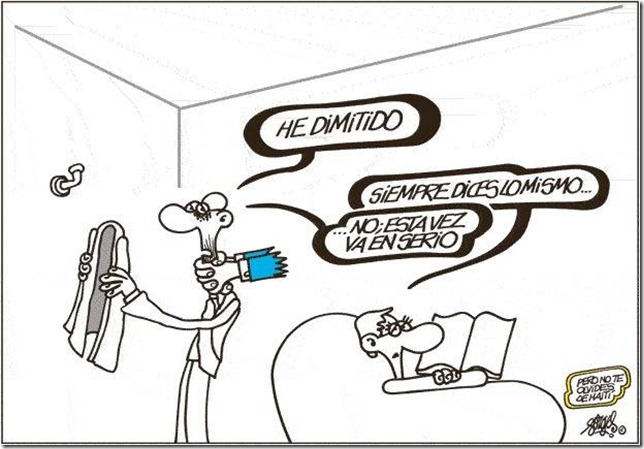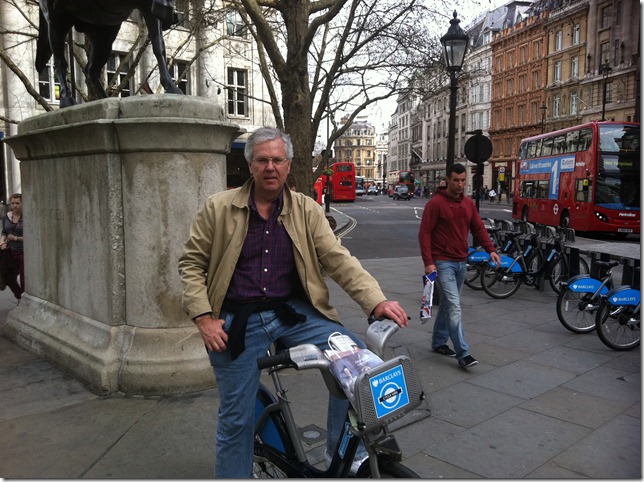El domingo pasado fue Easter. Yo he pasado estos días con la curiosidad de un extranjero. He estado oyendo acerca de Easter durante semanas, pero no sabía exactamente qué era. Busqué en Internet y encontré que es la fiesta central en el año litúrgico cristiano, debido a que marca el tiempo de la resurrección de Jesús, después de su cruzifixion y muerte. Por lo tanto, Easter es equivalente al Domingo de Resurrección que se celebra en España.
miércoles, 27 de abril de 2011
London XXXIV. Easter
El domingo pasado fue Easter. Yo he pasado estos días con la curiosidad de un extranjero. He estado oyendo acerca de Easter durante semanas, pero no sabía exactamente qué era. Busqué en Internet y encontré que es la fiesta central en el año litúrgico cristiano, debido a que marca el tiempo de la resurrección de Jesús, después de su cruzifixion y muerte. Por lo tanto, Easter es equivalente al Domingo de Resurrección que se celebra en España.
martes, 26 de abril de 2011
jueves, 21 de abril de 2011
London XXXIII. Interchange
We went at a ‘café’ and we've been talking over two hours, split in English and Spanish. The experience was wonderful. Will is a very nice guy and the exchange has been very useful and entertained. We questioned about each other and then we talked about several British topics in which I was interested. The referendum that is called for 5th. May, which proposes an important change in the electoral system, the royal wedding and other stuffs. In addition to the pleasant atmosphere, I found we had many things in common. We are going to met us again next week, so I'll tell you how it goes.
Fuimos a una cafetería y estuvimos hablando más de dos horas, repartidas en Inglés y Español. La experiencia ha sido estupenda. Will es un tío muy agradable y el intercambio ha sido muy útil y entretenido. Nos interrogamos el uno al otro acerca de cada uno y luego hablamos sobre varios temas británicos en los que yo estoy interesado. El referéndum convocado para el 5 de mayo, en el que se propone un cambio importante en el sistema electoral, la boda real y otros asuntos. Además de la atmósfera agradable, me pareció que teníamos muchas cosas en común. Hemos quedado en vernos de nuevo la próxima semana, así que ya te diré cómo va la cosa.
El ibis ‘eremita’
(Publicado en la edición digital de El Mundo de hoy).
MEDIO AMBIENTE | Instalado un sistema de videovigilancia en sus nidos
El ibis eremita se reproduce en Europa cinco siglos después y crea una colonia

Dos ejemplares de ibis eremita, en la provincia de Cádiz
I have been thinking about upload or not this post and finally I tell myself, why not? It’s funny. But I don’t know what is more funny if the name of the bird or that it is under video surveillance.
martes, 19 de abril de 2011
London XXXII. Disgrace
The newspaper says and prove today what we all knew since long time ago. The invasion of Iraq was a looting oil operation, which Spain joined without receiving anything from the booty. Only disgrace, and 202 people dead in Madrid.
Traducción: Londres XXXII. Vergüenza.
El periódico dice y prueba hoy lo que todos sabíamos desde hace mucho tiempo. Que la invasión de Iraq fue una operación de pillaje petrolífero, a la que España se unió sin percibir nada del botín. Sólo vergüenza y los 202 muertos de Madrid.
lunes, 18 de abril de 2011
London XXXI. Two bananas

Traducción: Dos plátanos.
Esta mañana fui a comprar un par de plátanos en una frutería al aire libre que hay en el centro de Wimbledon. Pregunté por el precio, y entendí cincuenta (fifty) peniques, cuando en realidad eran sesenta (sixty) peniques. Continué caminando hacia la Escuela pensando que mi habilidad para entender lo que me dicen por la calle es aun muy pobre. Pero me consolé pensando que, a fin de cuentas, la diferencia es de solo 10 peniques.
miércoles, 13 de abril de 2011
London XXX. Y de repente, Sevilla
London XXIX. The Grand National and the bullfights
Traducción: El Grand National y las corridas de toros.
Dos caballos cayeron fatalmente en la carrera del sábado y alguien ha escrito esta semana en el periódico: "...al infierno con el espectáculo. El que quiera un espectáculo con sangre que se vaya a España y vea una corrida de toros".
-- Desde Mi iPhone
lunes, 11 de abril de 2011
London XXVIII. A los thailandeses no les gusta el salmorejo
Yesterday was a long day for me. I went to the school in the morning and I met with Mati to have lunch in Wimbledon, before to go to the airport, because she went back to Seville. When we went to take the tube to Heathrow, the line was closed because an incident at a nearby station. As there were not tube, there were not taxis. Even now it seems impossible to have arrived at the airport in time for boarding. We had to take 3 different buses to reach the first open tube station and walking long distances between one bus stop and the next one. We carried the Mati's suitcase and my backpack with a load of which I will tell you later. Fortunately, all indications we asked people about the bus routes and the bus stops were correct.
jueves, 7 de abril de 2011
London XXVII. Portugal baylout
It's frightening, isn't it?
Traducción: El rescate de Portugal
Todos los medios dicen hoy que España es demasiado grande para caer, pero que también es demasiado grande para poder salvarla.
Da miedo, no?
-- Desde Mi iPhone
sábado, 2 de abril de 2011
London XXVI. British newspapers
London XXV. Any weekend
Yesterday we said goodbye to a few colleagues from the School, who finished their courses and returned to their countries. A large group of us had lunch together and then we fixed an appointment to a meeting in the evening. I decided to go out, after some doubts. We went to a nightclub in the centre of Wimbledon, where a half of the school was or was coming. I drank a couple of beers and spent the necessary time to ensure that such sites is the same in all countries. But here in adition with a stifling heat. The truth is that I amused myself watching the people. After two beers I went home and the rest remained there. This was because the age, I suppose. I mean the age of them.
I went out early today in the morning to visit the Churchill Museum and the Cabinet War Rooms. I thought the site would be small (it is true) and there would be many visitors. There were not a lot of people early, but it is also true that this museum is less touristy and more to the British public. However, it is very interesting and the museum dedicated to Churchill is a very successful exhibition with many different elements and museum techniques, which display in a fairly pleasant way the national hero’s life and works.
Then I went to the National Gallery because I wanted to buy a museum guide and I did. I doubted if I bought it in English or Spanish and decided to buy the English version. I was glad. I sat for a while to read the review of two or three paintings that interested me and I found I could read them very fluently, with a few gaps which my iPhone quickly resolved. How was life before? And only a few months ago. I ate in the café of the National Gallery, where I stayed for a while reading the newspaper while I was bathing in the sun which coming through the window and still not annoying.
I went back to the street and it was early, so I decided to try a new way to visit London: on a bicycle.
It was an exciting, although a bit dangerous experience. The rental system and delivery of the bike is much easier than in Seville, you do not have to manage any paper, just to put your credit card, but Seville is much better prepared for cyclists than London (poor Monteseirín, no one will thank him). I was riding up and down around Central London for a while. We went along Oxford Street and Regent Street, where I risked my life between cars and buses, but then I went to quiet streets, went down to Trafalgar Square and I arrived to Buckingham Palace by The Mall.
Traducción cortesía de Google, with arrangements.
London XXV. Cualquier fin de semana.
Ayer despedimos a unos cuantos compañeros de la Escuela, que terminaban sus cursos y volvían a sus países. Comimos juntos un nutrido grupo y luego quedamos para salir por la noche. Después de dudarlo, al final, me animé a salir. Fuimos a una discoteca, en el centro de Wimbledon, donde estaba o fue llegando la mitad de la Escuela. Me tomé un par de cervezas y pasé allí el tiempo necesario para comprobar que ese tipo de sitios es igual en todos los países. Pero aquí con el detalle añadido de un calor sofocante. La verdad es que me entretuve contemplando el paisanaje. Después de las dos cervezas volví a casa. Allí permaneció el resto. Cosas de la edad, supongo. De la de ellos, quiero decir.
Hoy salí de casa de buena mañana para visitar el Churchill Museum y las Cabinet War Rooms. Pensé que el sitio sería pequeño (es verdad) y los visitantes numerosos. No había mucha gente a primera hora, pero, es verdad también que es un museo menos turístico y más para el público británico. No obstante, es muy interesante y la parte del museo dedicada a Churchill es una exhibición muy lograda, con muchos elementos y técnicas museográficas diferentes, que consiguen exhibir de un modo bastante ameno la vida y obras del héroe nacional.
Después me acerqué a la National Gallery, porque quería comprar una guía del museo y así lo hice. Dudé si comprarla en inglés o en español y decidí comprar la versión inglesa. Me alegré. Me senté un rato a leer la reseña de dos o tres cuadros que me interesaban y comprobé que podía leerlas casi de corrido, con escasas lagunas que resolvía mi iPhone rápidamente. ¿Cómo era la vida antes? Y solo hace unos pocos meses. Comí en la agradable cafetería de la National Gallery, en la que me quedé un rato leyendo el periódico, mientras me bañaba el sol que entraba por la ventana y que todavía no es molesto.
Salí de nuevo a la calle y era temprano, así que decidí probar una nueva manera de visitar Londres: en bicicleta. Ha sido una experiencia excitante, aunque un poco peligrosa. El sistema de alquiler y entrega de las bicicletas es mucho más sencillo que en Sevilla, no tienes que hacer ningún papel, solo poner tu tarjeta de crédito, pero Sevilla está mucho mejor preparada para los ciclistas que Londres (pobre Monteseirín, nadie se lo agradecerá). Anduve pedaleando por todo el centro de Londres durante un buen rato. Oxford Street y Regent Street, donde me jugaba la vida entre coches y autobuses, aunque después me metí por calles más tranquilas, baje por Trafalgar Square y llegué hasta Buckingham Palace por The Mall.







